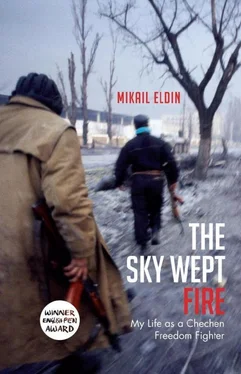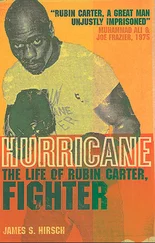Mikail Eldin
THE SKY WEPT FIRE
MY LIFE AS A CHECHEN FREEDOM FIGHTER
Translated from the Russian by Anna Gunin
To those who fell undefeated, for whom the Sky wept
It is only possible to write beautifully about war if you have never witnessed it from within. It was my fate, though, to spend long years seeing war from the inside. And so much happened that perhaps would have been better forgotten, but it was my duty to remember. Yet this book is not a chronicle. After all, memories can be messy… For a chronicle, you need the utterly cold and impartial mind of a historian. Whereas I have followed my memories haphazardly… Listening more to my heart. Trying to understand just what it was that happened to me – a man far removed from the blood and romance of war. I have tried to be as neutral as possible in my account of these events, yet at the same time I remain deeply partisan. Partisan about everything I saw.
This is not a seductive story of war for the adventurous or the romantic. I’ve merely recounted to the best of my ability what I was fated to witness and what my memory deemed important. I’ve omitted the names of persons with whom I crossed paths – some are still alive, and those who are dead have relatives who are still alive. Though on second thoughts, I don’t know if I could have resisted the temptation, for the sake of historical record, to name ‘names, addresses and safe houses’ (as President Putin once urged his citizens to do) had it not been for my strange memory, which has blotted the names from my mind, leaving only the faces and their actions. Indeed, history is made up not of names, but of the personalities behind them.
And the wanderer enquired of the people, ‘Tell me, what has brought about your strife?’
‘We’re quarrelling over a pearl,’ someone replied.
‘What is a pearl?’ the wanderer asked.
The people replied, ‘A pearl is precious, you can buy anything with it.’
‘For the love of God! Give me the pearl,’ entreated the wanderer. ‘I would buy mercy from God…’
‘You can’t buy feelings with them…’ responded the people in surprise.
‘And what is their value if they cannot bring mercy?’ said the wanderer, walking away.
From a Sufi parable
Everything began with two huge blasts rocking the centre of Grozny, capital of Chechnya, a country enjoying its fourth year of independence. It was 26 November 1994 and dawn was breaking on an unusually warm autumn morning. There had already been occasional explosions rumbling through some of the city’s districts in areas targeted for their industrial and strategic importance, but it was this morning’s blasts that would mark the beginning of the terrible tragedy. Three years had passed since Dzhokhar Dudayev had been elected the first president of a sovereign Chechen state. From the moment independence was declared, Russia began hatching schemes to meddle with and destroy Chechen autonomy. Hoping to exploit the Chechen people’s grievances, Russia created and bankrolled military, rather than political, opposition to Dudayev’s rule. This Armed Opposition – essentially, armed groups hired by Russia and headed by Russian Army officers and intelligence agents – tried several times to take the city in the hope of ousting President Dudayev. Saboteurs had also committed the odd terrorist attack within the city limits, blowing up facilities of strategic value, such as electrical substations and oil depots, but, despite the ferocity of these acts, they had inflicted little damage on the city, and even less on the government of the day. So the residents of Grozny were getting used to sporadic explosions and bursts of gunfire and were not unduly alarmed on that November morning.
At the time I was cultural editor for the Chechen literary periodical Vast and wasn’t particularly interested in the military side of politics, although I’d been closely following the events unfolding in Chechnya and kept abreast of political developments. I had my own views on the artificially engineered showdown between the Armed Opposition and the ‘dictatorship’. Rather than rallying around their president and building a sovereign state, the political opposition, acting on personal grievances and ambitions – or most of them, at any rate – went into open confrontation, thus paving the way for Russia’s squalid meddling in Chechnya’s internal affairs. The President’s administration made no special effort to win over those members of the opposition who were intelligent, educated and devoted to their nation – and there were many such people – to join in building an independent state. While both sides were fervently proclaiming their willingness to unite and accusing the other of being uncooperative, they were also busy laying down conditions that were unacceptable to the other side. The Armed Opposition was incapable of listening to anyone but the Russian intelligence services funding their mission to stir up tensions and unleash conflict. Such was the situation that had arisen in Chechnya by that momentous day. The political background and root causes of this tragedy are themselves deserving of a book. But let us return to the first day of all-out war.
The moment I heard the blasts, my journalistic curiosity got the better of me and I ran straight into town, heading in the direction the sound had come from: Freedom Square. I lived quite close to the city centre – around twenty minutes on foot – and before long I had come to the site of the detonations. As I was approaching the square, I saw a large number of armed men standing around the building of the Department for State Security. Several tanks from the Chechen Armed Forces’ Shali Tank Regiment stood on Ordzhonikidze Avenue. Beyond them, a hundred metres from the Presidential Palace, were the carcasses of two tanks that had been ripped apart by the massive explosions. The turret of one tank lay a few dozen metres from the burnt-out hull. An anti-tank shell from a Russian-manufactured RPG-7 must have pierced the armour and detonated the ammunition inside, tearing up the tank as if it were a papier-mâché toy. As they came out on to the square in front of the Presidential Palace, these tanks clearly hadn’t had time to fire a single round. Chechen Army soldiers had taken up position in all the streets and alleys leading to the Presidential Palace. Glass splinters from the panes shattered by the blast were crunching under my feet. Civilians mingled with the soldiers, naïvely huddling around the tanks, completely oblivious to the danger a tank posed, even if it was one of ours. There were no dead or wounded to be seen and I still had no idea what was going on. I imagined two Armed Opposition tanks must have strayed into the city, most likely because their crews were drunk, and they’d been hit. That type of thing had happened before. And the crews, I was almost certain – the number of times I’d seen it in the movies – must have fled their burning vehicles and been taken prisoner. I went up to some armed young men – special forces, judging by their uniforms – and asked, ‘What’s happening? Whose tanks were hit?’
‘The opposition have come into the city with the Russian Army. They’re Russian tanks,’ one of them told me.
Читать дальше














